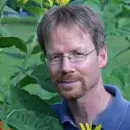
Loren H. Rieseberg
Loren H. Rieseberg is Distinguished Professor of Botany at Indiana University and Professor of Botany at University of British Columbia. Rieseberg is a botanist who uses research on sunflowers to address the oldest and most vexing problem in evolutionary biology—how species originate. One longstanding debate is whether geographic isolation is required for speciation, and if not, how new species occupying a single territory (“sympatric”) can become both viable and reproductively isolated from parent species. Rieseberg was able to show that one sunflower species, Helianthus anomalus, results from an ancient natural hybridization of two other older species. Remarkably, Rieseberg has been able to replicate this hybridization under controlled conditions, in effect, reproducibly reenacting the creation of a new species. These results suggest that some factor intrinsic to the chromosomal structure of the sunflower facilitates a recombination process, leading to viable, reproductively isolated sympatric species. His genetic mapping studies support this hypothesis, and similar reports of others in different species indicate that hybridization-induced chromosomal rearrangement may be a widespread phenomenon. Throughout his work, Rieseberg applies a full range of theoretical and experimental approaches, from classical crossing experiments to contemporary molecular biologic techniques, to answer key questions of evolutionary genetics. His lab integrates high-throughput genomic methods, bioinformatics, ecological experiments, and evolutionary theory to study ongoing questions related to the genetics of speciation, adaptation, domestication, and weed evolution. Rieseberg has received numerous awards for his work, including the George R. Cooley Award, David Starr Jordan Prize, A.R. Wallace – R.E. Franklin Medal, a MacArthur ‘genius’ Fellowship, a Guggenheim Fellowship, and the Darwin-Wallace Medal. He has published more than 150 articles in professional journals such as New Phytologist, Science, and Trends in Ecology and Evolution.